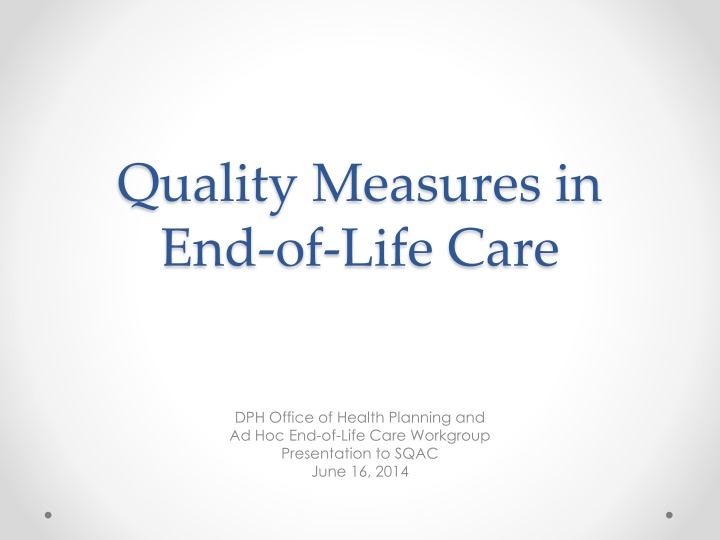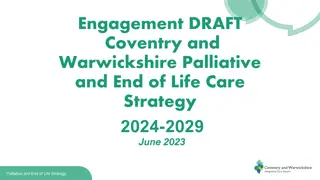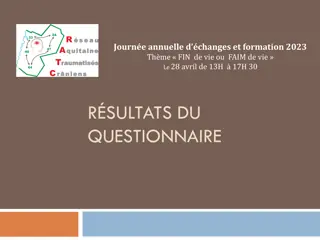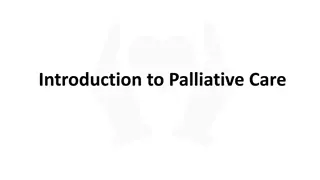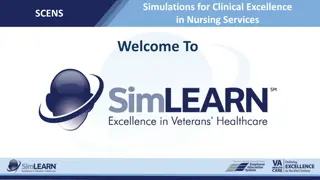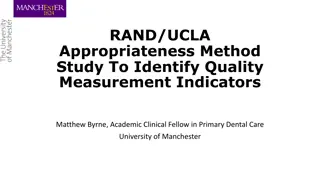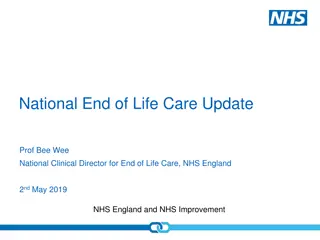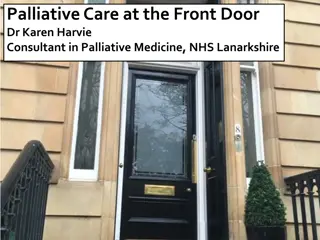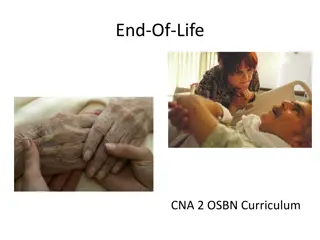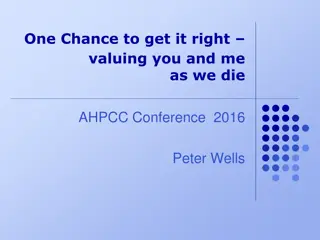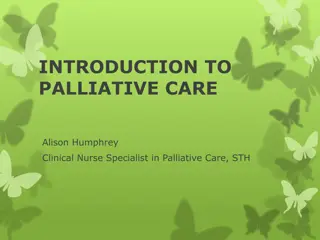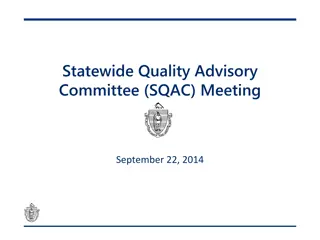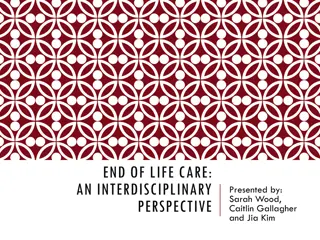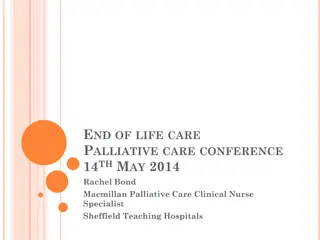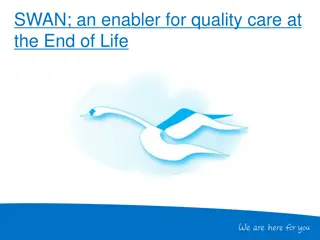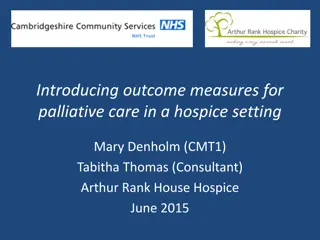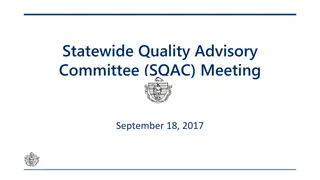Quality Measures in End-of-Life Care
This presentation discusses the importance of quality measures in end-of-life care, highlighting key findings and recommendations from the Massachusetts Expert Panel on End-of-Life Care. It covers topics such as patient-centered care, regulations, and the distribution of information on palliative care options. The agenda includes updates on end-of-life expert panel reports and discussions on quality measures submitted to SQAC.
Download Presentation

Please find below an Image/Link to download the presentation.
The content on the website is provided AS IS for your information and personal use only. It may not be sold, licensed, or shared on other websites without obtaining consent from the author.If you encounter any issues during the download, it is possible that the publisher has removed the file from their server.
You are allowed to download the files provided on this website for personal or commercial use, subject to the condition that they are used lawfully. All files are the property of their respective owners.
The content on the website is provided AS IS for your information and personal use only. It may not be sold, licensed, or shared on other websites without obtaining consent from the author.
E N D
Presentation Transcript
Quality Measures in End-of-Life Care DPH Office of Health Planning and Ad Hoc End-of-Life Care Workgroup Presentation to SQAC June 16, 2014
Ad Hoc End-of-Life Care Measures Workgroup Katherine Ast, MSW American Academy of Hospice and Palliative Medicine Madeleine Biondolillo, MD Associate Commissioner Massachusetts Department of Public Health Elizabeth Chen, MBA, MPH UMass Boston and Partners HealthCare James Conway, MS Harvard School of Public Health; Past Vice Chair, Mass. Expert Panel on End-of-Life Care Beth Israel Deaconess Medical Center; Past Chair, Mass. Expert Panel on End-of-Life Care Lachlan Forrow, MD Laurie Herndon, MSN, GNP-BC Director of Clinical Quality Massachusetts Senior Care Foundation Dale Lupu, MPH, PhD Professorial Lecturer in Health Policy George Washington University School of Public Health Co-Chief of Palliative Care UMass Memorial Healthcare Suzana Makowski, MD, MMM Partners HealthCare Terrence O Malley, MD 2
Agenda 1. Background o Madeleine Biondolillo, MD statute and regulation o Lachlan Forrow, MD & James Conway, MS End of Life Expert Panel Report Update 2. End of Life Quality Considerations o Elizabeth Chen, MBA, MPH o Lachlan Forrow, MD o Suzana Makowski, MD, MMM 3. Discussion o EOL Quality Measures Submitted to SQAC 3
Background Massachusetts Expert Panel on End-of-Life Care 2010 Report: Patient-Centered Care and Human Mortality: The Urgency of Health System Reforms to Ensure Respect for Patients Wishes and Accountability for Excellence In Care* Key Findings/Recommendation: 1. Universal agreement: Patients with serious advancing illness must (a) be reliably informed, early on, of the full range of options for their care and (b) have access to and receive care that respects their informed preferences 2. Statewide Quality Measures are required to ensure concordance between informed preferences and care received *http://molst-ma.org/sites/molst-ma.org/files/FINAL-EXPERT-PANEL-REPORT-APPROVED.pdf 4
Statute Chapter 224 of the Acts of 2012 Sec 227 - (b) The commissioner shall adopt regulations requiring each licensed hospital, skilled nursing facility, health center or assisted living facility to distribute to appropriate patients in its care information regarding the availability of palliative care and end-of-life options. (c) If a patient is diagnosed with a terminal illness or condition, the patient s attending health care practitioner shall offer to provide the patient with information and counseling regarding palliative care and end-of-life options appropriate for the patient, including, but not limited to: (i) the range of options appropriate for the patient; (ii) the prognosis, risks and benefits of the various options; and (iii) the patient s legal rights to comprehensive pain and symptom management at the end-of-life. 5
Regulation The proposed regulatory amendments to 105 CMR 130.000: Hospital Licensure, 105 CMR 140.000: Licensure of Clinics and 105 CMR 150.000: Licensing of Long-Term Care Facilities create a new requirement for hospitals, clinics, and skilled nursing facilities to provide patients with information about hospice, palliative care and end-of-life options. Facilities will fulfill this obligation by implementing a policy to identify appropriate patients, and providing these patients with an informational pamphlet that conforms to the Department s specifications. 6
Missing: Concordance Between Wishes and Reality From: Patient-Centered Care and Human Mortality, Report and Recommendations of the Massachusetts Expert Panel on End-of-life Care, 2010. 7
When Does End-of-Life Care Begin? Report of the American Hospital Association Committee on Performance Improvement, August 2012 8
Ideal High Quality End of Life Care 1. Patient Understands Death May Be Approaching (Phase 3): Prognosis Patient Understands Quality of Life Tradeoffs 2. 3. Patient Decisions match care delivered from Phase 3 to Death Prefer Hospice Enrolled in Hospice for Optimal Beneficial Period Prefer No Hospice Not Enrolled in Hospice 4. Services Delivered by Skilled Professionals to Optimize Quality of Life and Minimize: Patient Physical Suffering Patient Psychological or Existential Suffering Family Suffering 9
Barriers to Ideal Care 1. No Objective Measure for Onset of Phase 3 2. Specialization Leading to Fragmented Care: Who is responsible/accountable for care from Phase 3 to Death? 10
Conceptual Framework Measuring Quality in EOL Care Continuum Phase 4 Phase 3 1. Patient Understands Prognosis 3. Disease/Sympt om Treatment 2. Evaluation of Options 4. Actively Dying 5. Family Experience 11
Measuring What Matters Under Development by the American Academy of Hospice and Palliative Medicine and the Hospice and Palliative Nurses Association 1. Hospice and Palliative Care Comprehensive Assessment Within Certain Time Periods After Admission Any Pain Treatment Screening for Physical Symptoms Dyspnea Screening and Management Discussion of Emotional or Psychological Needs Discussion of Spiritual/Religious Concerns (NQF #1647) Proportion Admitted to Hospice for < 3 days (NQF #0216) Emergency Room Visit in Last 30 Days of Life (NQF #0211) Documentation of Surrogate 10. Treatment Preferences (NQF #1641) 11. Treatment Preferences Followed 12. Family Evaluation of Palliative Care http://aahpm.org/uploads/education/MWM%20Top%2012%20Measure %20Information%20and%20Comments.pdf, Accessed June 4, 2014. 2. 3. 4. 5. 6. 7. 8. 9. 12
Measuring What Matters Assumes Access to Palliative Care 14
Concordance Line NQF# Public Nomination Measuring What Matters Consumer Assessments and Reports of EOL Care 1 NQF #1632 Family Evaluation of Palliative Care 2 NQF #326 Advance Care Plan Documentation of Surrogate 3 NQF #216 Proportion Admitted to Hospice < 3 days Same 4 Family Evaluation of Palliative Care Same 5 NQF #208 Family Evaluation of Hospice Care Family Evaluation of Palliative Care 6 NQF #1639 Dyspnea Screening Dyspnea Screening & Management 7 NQF #1638 Dyspnea Treatment Dyspnea Screening & Management 8 NQF #1641 Treatment Preferences (currently in SQMS) Same; also Treatment Preferences Followed 9 NQF #1647 Beliefs/Values Addressed Discussion of Spiritual/Religious Concerns 10 NQF #1634 Pain Screening Screening for Physical Symptoms Hospice and Palliative Care Comprehensive Assessment 11 NQF #1637 Pain Assessment Bowel Regimen for Patients Treated with an Opioid ----- 12 NQF #1617 ------ Any Pain Treatment 13 ----- 14 Discussion of Emotional or Psychological Needs ----- 15 NQF #0211 Emergency Room Visit in Last 30 Days of Life 15
